

How to Become a Data Scientist for Free. Big Data, Data Sciences, and Predictive Analytics are the talk of the town and it doesn’t matter which town you are referring to, it’s everywhere, from the White House hiring DJ Patil as the first chief data scientist to the United Nations using predictive analytics to forecast bombings on schools.
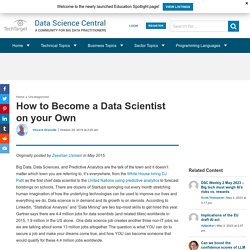
There are dozens of Startups springing out every month stretching human imagination of how the underlying technologies can be used to improve our lives and everything we do. Data science is in demand and its growth is on steroids. According to Linkedin, “Statistical Analysis” and “Data Mining” are two top-most skills to get hired this year. Gartner says there are 4.4 million jobs for data scientists (and related titles) worldwide in 2015, 1.9 million in the US alone. One data science job creates another three non-IT jobs, so we are talking about some 13 million jobs altogether.
Let me also mention few paid resources that I am a fan of before I tell you how to do all that for free. Supporting Information: Index. HMIS-Data-Dictionary.pdf. Premis-2-0.pdf. Oracle Concepts - Data Dictionary. The data dictionary is full of 'Metadata', information about what is going-on inside your database.
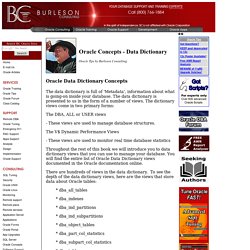
The data dictionary is presented to us in the form of a number of views. The dictionary views come in two primary forms: The DBA, ALL or USER views - These views are used to manage database structures. The V$ Dynamic Performance Views - These views are used to monitor real time database statistics. 0README AIAN SF. NonInvasive-Data-GovernanceChapter2.pdf. Real-World Data Governance: Data Governance Roles & Responsibilities. Artifacts to Enable Data Goverance. Seiner_Bob.pdf. Kaggle: The Home of Data Science. Big Data Certifications: Finding The One That Works For You. We can't tell you which big data certification programs to choose -- that depends on a number of variables in your personal IT career goals and work situation.
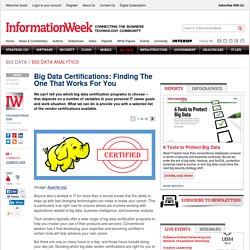
What we can do is provide you with a selected list of the vendor certifications available. 1 of 12 Anyone who’s worked in IT for more than a minute knows that the ability to keep up with fast-changing technologies can make or break your career. This is particularly true right now for anyone whose job involves working with applications related to big data, business intelligence, and business analysis. Tech vendors typically offer a wide range of big data certification programs to help you master your use of their products and services. But there are only so many hours in a day, and those hours include doing your day job. Vendors including IBM, HP, Oracle, EMC, and Cloudera are among those offering certification programs for IT professionals working with big data. Data Management 4: Data Stewardship. This is the fourth blog post in the Data Management series.
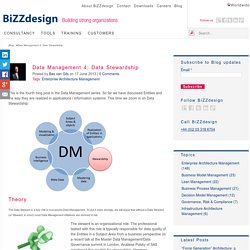
So far we have discussed Entities and the way they are realized in applications / information systems. This time we zoom in on Data Stewardship. Theory. Understanding the Role of Data Stewards in Data Management. Depending on the organization, the role of the data steward may be formally defined, or informally recognized by the business.
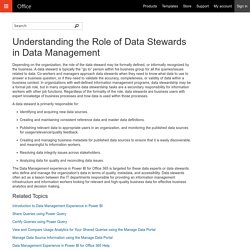
Data steward. A data steward is a person responsible for the management of data elements (also known as critical data elements) - both the content and metadata.
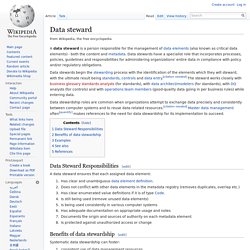
Data stewards have a specialist role that incorporates processes, policies, guidelines and responsibilities for administering organizations' entire data in compliance with policy and/or regulatory obligations. Master Data Management: Debunking Mega-Vendor Hype. Data Stewards Define Data Quality. Companies traditionally place data management tasks with the Information Technology department.
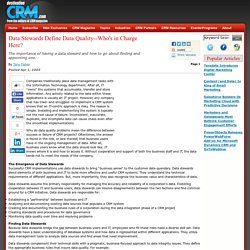
After all, IT "owns" the systems that accumulate, transfer and store information. Any activity related to the data within these applications is usually an IT project. However, any company that has tried--and struggled--to implement a CRM system knows that an IT-centric approach is risky. The reason is simple. NSF-ENG: COV Reports and Annual Updates. Distinctions Emerge in U.S. Government Plans for Expanding Access to Research. Research funded by the U.S. government is finally going to be available for anyone to read and cite, based on plans laid out by the agencies that administer the funding.
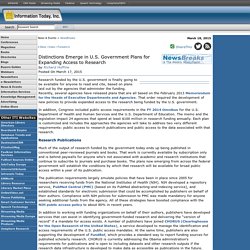
Recently, several agencies have released plans that are all based on the February 2013 Memorandum for the Heads of Executive Departments and Agencies. That order required the development of new policies to provide expanded access to the research being funded by the U.S. government. In addition, Congress included public access requirements in the FY 2014 Omnibus for the U.S. How Will The BRAIN Initiative Work At NIH? - Brain Research through Advancing Innovative Neurotechnologies (BRAIN)- National Institutes of Health (NIH) Image of the dentate gyrus of the mouse hippocampus using Brainbow transgenes.
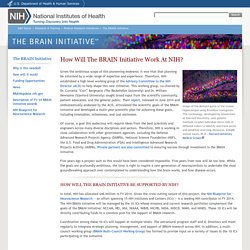
This technology, developed by researchers at Harvard University, uses genetic methods to label individual nerve cells in different colors to identify and track axons and dendrites over long distances. Credit: Joshua Sanes, Ph.D., Harvard University Medical School Given the ambitious scope of this pioneering endeavor, it was vital that planning be informed by a wide range of expertise and experience. Therefore, NIH established a high level working group of the Advisory Committee to the NIH Director (ACD) to help shape this new initiative.
This working group, co-chaired by Dr. Of course, a goal this audacious will require ideas from the best scientists and engineers across many diverse disciplines and sectors. Five years ago a project such as this would have been considered impossible. The Data Scientist’s Toolbox - Johns Hopkins University. By Data Librarians, for Data Librarians. Data Scientist Training for Librarians. Information specialists and data librarians. Who are information specialists and data librarians?
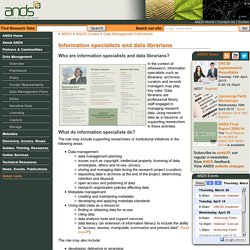
What do information specialists do? The role may include supporting researchers or institutional initiatives in the following areas: Data management data management planningissues such as copyright, intellectual property, licensing of data, embargoes, ethics and re-use, privacystoring and managing data during the research project (curation)depositing data in archives at the end of the project, determining retention and disposalopen access and publishing of dataresearch organisation policies affecting dataMetadata management creating and maintaining metadatadeveloping and applying metadata standardsUsing data (data as a resource) finding or obtaining data for re-useciting datadata analysis tools and support servicesdata literacy (an extension of information literacy to include the ability to "access, assess, manipulate, summarize and present data".
Read more) The role may also include: Position descriptions More job descriptions. Dm for librarians. Dm-for-librarians.pdf.